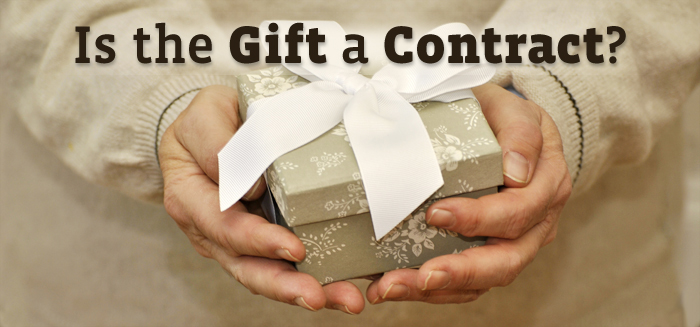
As the holiday season kicks into high gear, inFocus online takes a look at the legal and social dimensions of what gifts say about us and our relationships
By Victoria Leenders-Cheng
There’s always that one person – usually an in-law, sometimes a friend – who finished shopping two months before the winter holidays. As we dash out on last-minute excursions for that perfect gift, the image of our acquaintance, the gift completist, relaxing by the fireplace with a glass of mulled cider inspires envy, derision, and, yes, let’s be frank, admiration.
What is it about the season of gift-giving that gives rise to such high emotions and why is the process of selecting and exchanging gifts so fraught?
Believe it or not, comparative law has a theory to offer, and it’s a good one.
For starters, says Richard Hyland, a professor at Rutgers Law School, “a gift, if you think about it, is not a thing – a gift is a symbol of a relationship. In almost all human societies, that is how the gift functions and that’s why choosing a gift is such a hard thing, because we have to get the relationship exactly right.”
Hyland, author of Gifts: A Study in Comparative Law, was speaking at a civil law workshop presented by the Quebec Research Centre of Private and Comparative Law (QRCPCL) earlier this fall semester.
 Gifts are not only complex social objects but murky legal ones as well, Hyland said, explaining that gifts are viewed very differently in the common and civil law traditions. “Most civilian legal thinkers consider the gift to be a contract, whereas in the common law, we tend to think of it as part of the institution of personal property.”
Gifts are not only complex social objects but murky legal ones as well, Hyland said, explaining that gifts are viewed very differently in the common and civil law traditions. “Most civilian legal thinkers consider the gift to be a contract, whereas in the common law, we tend to think of it as part of the institution of personal property.”
In fact, this dilemma captures the essence of the mystery of gifts: they are neither contracts nor sales outright but they are at the same time a bit of both. Many of the decisions we must make in choosing a gift reflect this ambiguity.
“You know, for example, that when you’re invited to a wedding that you have to bring a gift,” Hyland said. “We give gifts and we know we’re required to give them and yet at the same time we believe that we are making that gift freely. There is a mixture of obligation and free will that is absolutely mysterious in the gift.”
The whys and hows of gifts
The trick of the gift is that it takes apart the terms of a regular contract such as the sale of property. “If I want to sell you my watch for $50, you transfer $50 to me, I transfer my watch to you, and all obligations are fulfilled,” Hyland explained.
This is not how a gift works and this is what makes it difficult, for example, to decide how much to spend on a particular gift.
In fact, said Lionel Smith, director of the QRCPCL, a gift abhors equality. Smith was speaking at a presentation to faculty members on the same subject earlier this year, the enthusiastic response to which prompted Smith to invite Hyland to speak to the Faculty.
In a gift economy, Smith argued, we constantly deny both equivalence and obligation. “La générosité ne montre pas son prix,” he quoted aphoristically, citing as another example the common exclamation and response heard as a gift is opened: “You shouldn’t have!” exclaims the recipient of the gift, to which the person who presented the gift replies, “Oh, it’s nothing.”
With a gift, the fulfillment of the obligation is deferred, or exchanged, for another gift, and when compared to a contract or a sale, the entire transaction is rather more complicated and less neat.
If the gift abhors equality, the gift also abhors the law,” Smith said. “The obligational characteristics of the gift economy must remain non-legal or they won’t work and so it is perhaps not surprising then that there is also a long history of the law’s suspicion of and antipathy towards gifts.”
Added Hyland, “If you look at a gift as a contract, you will be tempted, as the French are, to come up with these complex mechanisms to protect consent because they consider the gift to be suspicious. Giving something away for nothing – why would anyone want to do that?”
As we head into the holidays, though, this mysteriousness of gift-giving merits some thought. We receive gifts, we feel compelled to give gifts in return, and, however well or not the process goes this year, we repeat it all over again from year to year, with the same people, plus or minus a little hair and body weight. The gifts, in many ways, anchor our relationships through the passage of time. The law, meanwhile, struggles to incorporate gifts into its jurisprudence while maintaining this aura of mystery.
As Smith said, quoting from a translated version of Jacques Godbout’s book, L’esprit du don (read here [.pdf]), “The magic of the gift can only operate as long as the underlying rules are not formulated. As soon as they become explicit, the carriage turns into a pumpkin, the king turns out to be naked, and the gift is reduced to reciprocity.”
Photographs and props by Lysanne Larose, with the good-humoured help of gifted students and staff at the Faculty of Law.
